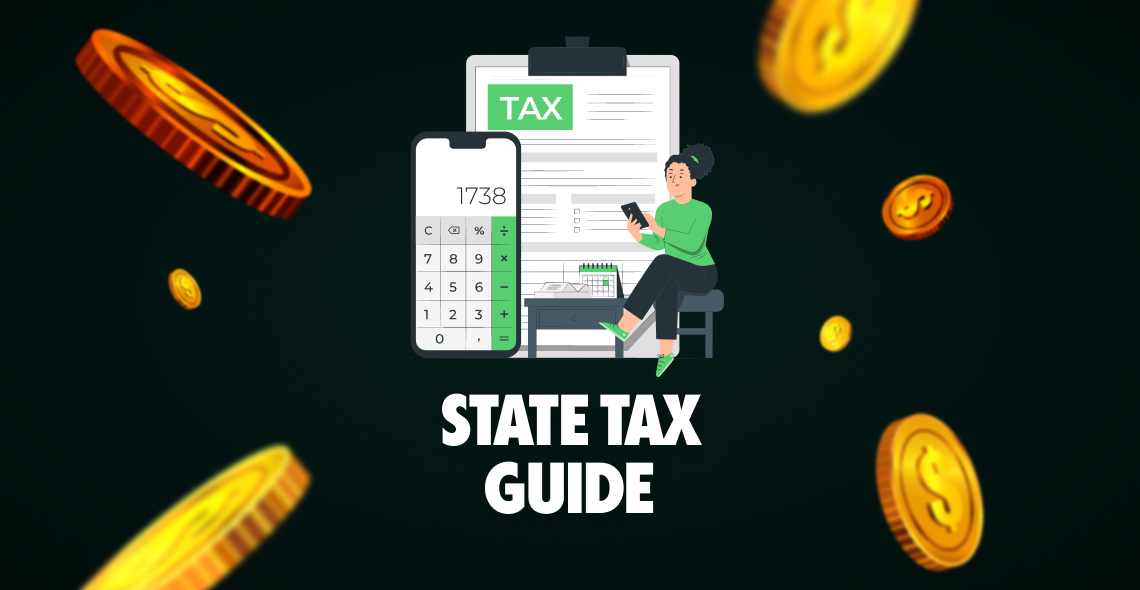Comprendiendo las implicaciones fiscales de los premios de lotería: una guía completa
Escrito por el equipo de Jackpot
26 de diciembre de 2024

Ganar la lotería suele considerarse un sueño hecho realidad, un momento que puede transformar tu vida de la noche a la mañana. Sin embargo, entre la emoción y la riqueza recién adquirida, es crucial reconocer que los premios de lotería conllevan importantes obligaciones fiscales. Tanto los gobiernos federales como estatales consideran las ganancias de lotería como ingresos sujetos a impuestos, y comprender estas implicaciones fiscales es esencial para gestionar tu fortuna de manera efectiva. Esta guía abordará cómo se aplican los impuestos a los premios de lotería, cubriendo tanto aspectos federales como estatales, y ofrecerá estrategias para una planificación fiscal eficiente.
Tributación federal de los premios de lotería: lo que debes saber
Retención de impuestos federales a los premios de lotería
Cuando ganas el pozo, Hacienda exige la retención automática del 24% de los premios que superen los $5,000. Esta retención es un paso preliminar para garantizar que una parte de tus ganancias se reserve para impuestos federales antes de que recibas el dinero. Es importante destacar que esta retención no es el monto final que debes pagar; simplemente es un pago inicial por tu obligación fiscal total.
Navegando los niveles de los impuestos federales
Los premios de lotería están sujetos al impuesto federal a las ganancias, el cual se calcula según los niveles impositivos federales. Estos niveles varían del 10% al 37%, dependiendo de tus ingresos imponibles totales, que incluye tus ganancias de lotería. Por ejemplo, en el año fiscal de 2024, si tus ingresos imponibles totales, incluidos tus ingresos regulares y premios de lotería, se encuentran entre $95,376 y $182,100, estarías en el nivel del 24%. Sin embargo, si tus ingresos superan los $578,126, estarías sujeto al nivel más alto del 37%. Esto significa que cuanto más ganes, mayor será el porcentaje de impuestos que se aplicará a tus ganancias.
Pago único vs. pagos anuales: implicaciones fiscales
Los ganadores de lotería a menudo deben elegir entre recibir sus premios en un pago único o mediante pagos anuales distribuidos a lo largo de varios años. Esta decisión tiene implicaciones fiscales significativas. Optar por un pago único significa que el monto total se grava en el año en que lo recibes, lo que podría colocarte en un nivel impositivo más alto y aumentar tu carga fiscal total. Por otro lado, elegir pagos anuales te permite distribuir la carga fiscal en varios años, lo que podría ayudarte a mantenerte en un nivel impositivo más bajo cada año.
Tributación estatal de los premios de lotería: un panorama diverso
Variación en las tasas impositivas estatales
La tributación estatal sobre los premios de lotería varía ampliamente en Estados Unidos; algunos estados no imponen impuestos estatales sobre estas ganancias, mientras que otros tienen tasas significativas. Comprender el panorama fiscal de tu estado es crucial para calcular con precisión tu obligación fiscal total.
Estados que no imponen impuestos a las ganancias de lotería
Varios estados no imponen impuestos estatales a las ganancias de lotería, lo que representa una ventaja fiscal significativa para sus residentes. Estos estados incluyen Florida, Texas, Dakota del Sur y Washington, entre otros. Aunque los impuestos federales aún se aplican, vivir en uno de estos estados puede resultar en un ahorro considerable en tus premios de lotería.
Estados con tasas específicas: altas, moderadas y bajas
En contraste, algunos estados tienen tasas específicas sobre los premios de lotería, que pueden clasificarse como altas, moderadas o bajas:
- Tasas altas: estados como Nueva York, Maryland y Nueva Jersey imponen tasas altas, con Nueva York reteniendo el 8.82% más impuestos locales, lo que la convierte en una de las tasas más altas del país.
- Tasas moderadas: estados como Minnesota y Arkansas tienen tasas moderadas; por ejemplo, Minnesota retiene el 7.25%.
- Tasas bajas: estados como Colorado y Michigan imponen tasas más bajas; Colorado retiene el 4%.
Tributación a no residentes: qué esperar
Si ganas la lotería en un estado donde no resides, aún podrías estar sujeto a impuestos estatales como no residente. Por ejemplo, Arizona aplica a los ganadores no residentes de la lotería una tasa del 5%. Es importante estar al tanto de estas posibles obligaciones fiscales si ganas la lotería mientras viajas o vives temporalmente en otro estado.
Calculando tu obligación fiscal total: un enfoque paso a paso
Combinando impuestos federales y estatales
Para calcular con precisión tu obligación fiscal total sobre los premios de lotería, necesitas considerar tanto los impuestos federales como los estatales. Aquí tienes un enfoque paso a paso:
- Determina el impuesto federal: calcula el impuesto federal basado en los niveles impositivos aplicables y la retención del 24%.
- Determina el impuesto estatal: calcula el impuesto estatal basado en la tasa específica de tu estado.
- Suma los impuestos federales y estatales: combina ambos para determinar tu obligación fiscal total.
Por ejemplo, si ganas $100,000 en Nueva York, el gobierno federal retendría el 24% ($24,000) y Nueva York retendría un 8.82% adicional ($8,820). Tu retención total sería de $32,820, pero podrías deber más dependiendo de tu situación fiscal general.
Ejemplos de cálculo: comprendiendo los diferentes escenarios
Considera estos ejemplos ilustrativos para entender cómo diferentes escenarios afectan tu obligación fiscal:
- Pago único en un estado con tasas altas: si ganas $1 millón en Nueva York y optas por un pago único, resultaría en un impuesto federal del 24% ($240,000) y un impuesto estatal del 8.82% ($88,200), sumando $328,200 en impuestos.
- Pagos anuales en un estado con tasas bajas: si ganas $1 millón en Colorado y optas por pagos anuales, tus pagos anuales estarían sujetos a impuestos federales y a una tasa estatal del 4%, lo que podría reducir tu carga fiscal a lo largo de los años.
Consideraciones fiscales adicionales: más allá del impuesto a las ganancias
Impuestos sobre donaciones y herencias: planificación para el futuro
Los ganadores de lotería también deben considerar las implicaciones de los impuestos sobre donaciones y herencias. Si decides compartir tus ganancias con familiares o amigos, puedes donar hasta cierto monto anual sin incurrir en impuestos sobre donaciones. Sin embargo, donaciones grandes pueden reducir tu exención vitalicia de impuestos sobre donaciones. Además, si falleces, tus ganancias restantes podrían estar sujetas a impuestos sobre herencias, dependiendo del tamaño de tu patrimonio y las leyes fiscales vigentes.
Obligaciones de declaración: cumpliendo con la Ley
Es esencial declarar con precisión las ganancias de lotería para cumplir con las leyes fiscales. La agencia de lotería te proporcionará un Formulario W-2G, que detalla el monto de tus ganancias y los impuestos retenidos. Debes reportar tus ganancias en el Formulario 1040 con tu declaración de impuestos, y podrías tener que completar formularios adicionales dependiendo del tamaño de tus ganancias y si elegiste un pago único o pagos anuales.
Planificación y estrategias fiscales: minimiza tu carga fiscal
Estrategias para reducir la obligación fiscal
Existen varias estrategias para minimizar tu carga fiscal sobre los premios de lotería:
- Distribuir los pagos: optar por pagos anuales puede ayudar a distribuir la carga fiscal en varios años, manteniéndote en un nivel impositivo más bajo.
- Consultar con un profesional fiscal: un asesor fiscal puede ayudarte a navegar las complejidades de las leyes fiscales y encontrar la forma más eficiente de gestionar tus ganancias.
Consideraciones sobre el estado de residencia: reubicación y ahorros fiscales
Mudarse a un estado sin impuestos o con tasas más bajas puede tener un impacto significativo en tu obligación fiscal sobre los premios de lotería. Por ejemplo, mudarte de Nueva York a Florida podría ahorrarte el 8.82% de impuestos estatales sobre tus ganancias. Sin embargo, es importante considerar otros factores, como los requisitos de residencia y las posibles implicaciones fiscales en tu nuevo estado.
Conclusión: navegando el complejo panorama fiscal
Comprender las implicaciones fiscales de los premios de lotería es crucial para gestionar tu fortuna de manera efectiva. Tanto los impuestos federales como los estatales pueden reducir significativamente el monto que recibes, por lo que una planificación cuidadosa es esencial. Aquí tienes los puntos clave a recordar:
- Impuestos federales: se aplica una retención del 24%, con la posibilidad de impuestos más altos según tu nivel impositivo.
- Impuestos estatales: varían ampliamente, con algunos estados sin impuestos y otros con tasas altas.
- Planificación fiscal: estrategias como optar por pagos anuales y consultar con un profesional fiscal pueden ayudarte a minimizar tu carga fiscal. Obligaciones de declaración: asegúrate de reportar correctamente tus ganancias en tu declaración de impuestos.
Buscar asesoramiento fiscal profesional es esencial para navegar las complejas leyes fiscales y sacar el máximo provecho de tus ganancias de lotería. Al comprender y planificar las implicaciones fiscales, puedes gestionar mejor tu nueva riqueza y asegurar tu futuro financiero.

